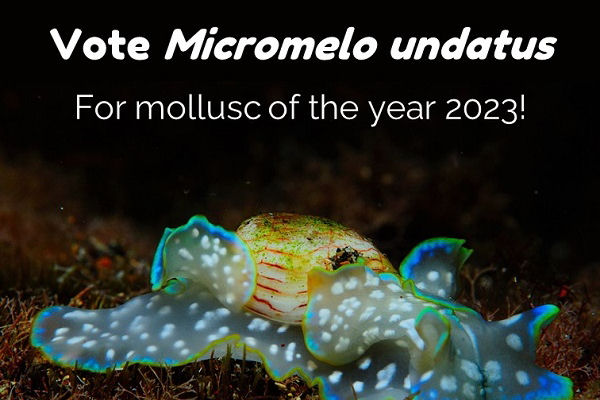The miniature melo ‘Micromelo undatus’, finalist in the Mollusc of the Year competition


The Mollusc of the Year competition is promoted by the LOEWE Centre for Translational Biodiversity Genomics (LOEWE TBG), an organisation that promotes basic research on the genomes of a wide range of organisms with the development of applied services and products. The winning mollusc for the 2023 edition will be determined through public voting, which can be done on the competition's website until 19 March.
An iridescent snail to decipher mollusc evolution
The species Micromelo undatus, selected by a scientific jury for the final phase of the competition, is a gastropod endemic to the Atlantic Ocean with a wide current distribution in tropical and subtropical latitudes. With nocturnal habits, it usually feeds on small crustaceans or polychaete worms and has a vivid colouring of great visual appeal, with an iridescent margin reminiscent of the colours of the rainbow. Its small carapace —less than 25 mm— is ornamented with red linear motifs like ancient paintings, and it glows red under ultraviolet light.
"From an evolutionary perspective, this species of unique characteristics originated about 200 million years ago, and can be considered a missing link between snails and slugs and the rest of molluscs (cephalopods, Bivalvia, polyplacophora, etc.)," notes researcher Carles Galià-Camps, a member of the UB's Department of Genetics, Microbiology and Statistics.
The sequencing of this species could provide relevant data for a better understanding of the evolution of heterobranch molluscs (especially snails and slugs). Therefore, knowing its genome would help to decipher many unknowns about the processes that determine the formation of the distinctive structures of snails, as well as the transition of molluscs from the aquatic to the terrestrial environment. Parallelly, the genome of the species Micromelo undatus also presents the opportunity to study such unique features as the genes responsible for the iridescent colours and glitter of the molluscs, adaptation to diverse environmental conditions and the processes of oceanic colonisation.
The winning mollusc in the 2022 edition was the species Polymita picta, a brightly coloured land snail that is endemic to Cuba.
